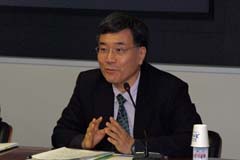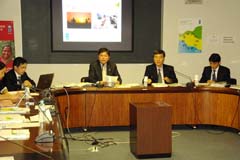JICA-RI Director Tambo Appraises the Human Development Report for Redefining the Meaning of "Work"
2015.12.22
On December 14, the United Nations Development Programme (UNDP) globally launched the 2015 Human Development Report (HDR) in Addis Abeba, Ethiopia. UNDP disclosed the Report in Japan on the same day at the United Nations University, inviting journalists, researchers, NGO representatives and more. Ichiro Tambo, director of JICA Research Institute, attended the launch as an invited expert to make comments on the Report. Tambo appraised the report for redefining the meaning of "work."
Ever since its first issue in 1990, the HDR has analyzed the outstanding global development agenda and its status. The 2015 Report's theme is "Work for Human Development." The Report analyzes disparities between paid and unpaid work and sheds light on changes in the work environment caused by globalization and the digital revolution. It also makes policy recommendations for achieving an equal and sustainable system in which all people have "decent work."

JICA-RI Director Ichiro Tambo
At the launch, Tetsuo Kondo, director of UNDP Representation Office in Japan, introduced the outline of the Report. He said, "In the past 25 years, we have reduced the number of people living under extreme poverty, from the perspective of human development, by two billion. Now, to move human development forward further, we must bring our attention to 'work.' We must think of ways to turn problems into opportunities, to ensure work gives people economic stability as well as fulfillment in life."
Next, Tambo gave comments on the Report. He said we must recognize realities that cannot be measured by economic indicators and consider the socially disadvantaged. He also talked about Sustainable Development Goals (SDGs) and ensuring human security.

Tetsuo Kondo, director of UNDP
Representation Office in Japan (center)
Tambo said, "The groundbreaking point of this Report is how it defines "Work" in a broader scope that encompasses jobs and employment, and its inclusion of unpaid domestic work, voluntary work and creative work, all which cannot be measured by GDP or other economic indicators." He mentioned the High-Level Expert Group meeting he attended in November on the Measurement of Well-Being and Development in Africa, hosted by the Organisation for Economic Co-operation and Development (OECD). He said the experts at this meeting recognized the problems of GDP such as its neglect of work within the home. He talked of his experience in development work spanning over 30 years, saying, "We are able to better facilitate development projects when we understand the unpaid work of women and children, which are often underestimated."
On considerations to the socially disadvantaged, Tambo said while women's housework is often discussed in the context of gender issues, employment of people with disabilities is an issue often neglected. He appraised the Report for clearly addressing "work for people with disabilities." He introduced a study that found people with disabilities have a twice to three-times higher rate of return to education compared to people without disabilities, cited from the book "Disability, Education and Employment in Developing Countries: From Charity to Investment" by JICA Visiting Scholar Kamal Lamichhane (current associate professor, Center for Research on International Cooperation in Educational Development, the University of Tsukuba). He said, "Education and employment of people with disabilities offer high benefits to society. Creating inclusive education and employment environments is a crucial issue for everyone."
Tambo also underlined the significance of 2015 in international development. The SDGs for 2030 were agreed upon in September, and Japan's new Development Cooperation Charter was approved by the Cabinet in February in which "Human Security" was identified as one of the basic policies of Japan's international cooperation. Tambo said, "JICA will continue to work for human security and will contribute actively to human development with this view. Additionally, I find it significant that UNDP is redefining the concept of human development and reconsidering its indicators at this time. We hope to actively participate in such discussions in due course."
During the question and answer session, participants talked about how the definition of decent work is different by country, and there was also a discussion regarding unpaid work.
JICA and UNDP have a long history of partnerships and collaboration. Akihiko Tanaka, former President of JICA, is the only Japanese member of the advisory panel for HDR since the 2013 edition.

事業事前評価表(地球規模課題対応国際科学技術協力(SATREPS)).国際協力機構 地球環境部 . 防災第一チーム. 1.案件名.国 名: フィリピン共和国.

事業事前評価表(地球規模課題対応国際科学技術協力(SATREPS)).国際協力機構 地球環境部 . 防災第一チーム. 1.案件名.国 名: フィリピン共和国.

事業事前評価表(地球規模課題対応国際科学技術協力(SATREPS)).国際協力機構 地球環境部 . 防災第一チーム. 1.案件名.国 名: フィリピン共和国.

事業事前評価表(地球規模課題対応国際科学技術協力(SATREPS)).国際協力機構 地球環境部 . 防災第一チーム. 1.案件名.国 名: フィリピン共和国.

事業事前評価表(地球規模課題対応国際科学技術協力(SATREPS)).国際協力機構 地球環境部 . 防災第一チーム. 1.案件名.国 名: フィリピン共和国.
scroll